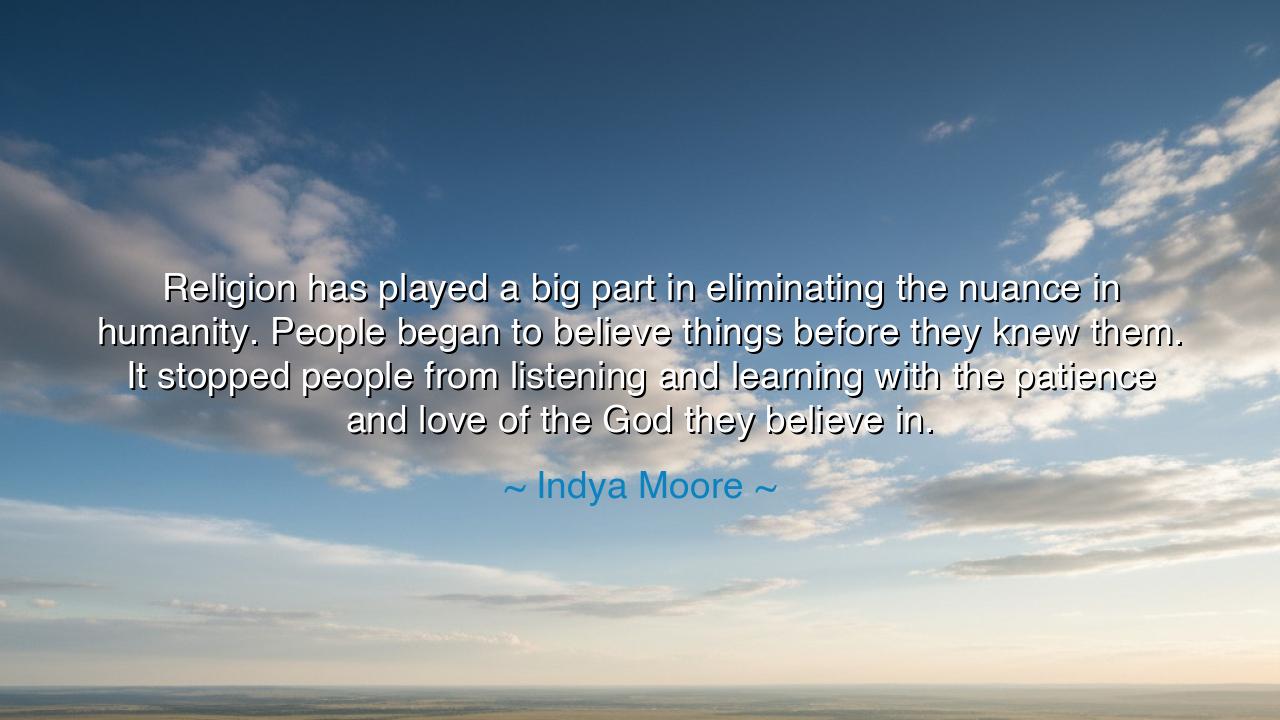
Religion has played a big part in eliminating the nuance in
Religion has played a big part in eliminating the nuance in humanity. People began to believe things before they knew them. It stopped people from listening and learning with the patience and love of the God they believe in.






Hear, O children of wisdom and seekers of truth, the voice of Indya Moore, who declared: “Religion has played a big part in eliminating the nuance in humanity. People began to believe things before they knew them. It stopped people from listening and learning with the patience and love of the God they believe in.” These words are not cast in anger alone, but in sorrowful observation. They lament the times when sacred teachings, meant to guide with tenderness, were hardened into rigid walls that silenced curiosity, quenched compassion, and dulled the subtle colors of human experience.
The origin of this truth lies in the story of faith itself. In the beginning, religion was born from humanity’s longing for meaning, for connection with the divine, for guidance in the storms of life. It brought light to darkness, community to solitude, and hope to despair. Yet, as the ages passed, the fire of devotion was sometimes cloaked in dogma, and the heart of compassion was buried beneath the weight of certainty. Men and women began to believe because they were told, not because they had listened, learned, and sought with love. The very tools meant to awaken the soul sometimes dulled its hearing.
Consider, O listeners, the story of Galileo Galilei, who gazed upon the heavens and declared that the earth moved around the sun. His discovery was born of careful listening to the cosmos, of humble observation. Yet the guardians of religion, bound by fear of uncertainty, silenced him, condemning him for daring to seek knowledge beyond what was decreed. They believed before they knew, and in so doing, they halted the dance between faith and reason. The voice of nuance was stifled, and the world had to wait centuries for the truth to be embraced.
Yet let us not misunderstand: Moore’s words do not condemn faith itself, nor the yearning for the divine. They call us back to the patience and love of the very God whom religion claims to serve. For true faith is not deafness but openness; not rigidity but humility; not arrogance but compassion. The error comes when humans mistake certainty for holiness, when they seek to control rather than to understand, when they exalt belief above learning. The true path is gentler: to seek with wonder, to listen with care, to love with endurance.
This wisdom is not for the religious alone, but for all who cling too tightly to their own certainties. Whether in politics, philosophy, or personal life, when one believes without knowing, when one clings without listening, when one judges without love, then the richness of humanity’s nuance is lost. Diversity becomes division, mystery becomes threat, and compassion withers beneath the weight of pride. Moore’s teaching warns us to guard against this in every part of life.
The lesson, then, is clear: do not fear the unknown, but walk into it with patience. Do not cling to belief as a weapon, but hold it as a lantern, lighting the way toward deeper understanding. Practice listening before speaking, learning before judging, and loving before condemning. In this way, you honor not only your fellow humans but also the divine spirit of love that dwells in every tradition.
Practical actions flow from this truth. Ask questions of your faith, your leaders, and your own heart. Seek to understand those who are different from you before you dismiss them. Read widely, listen deeply, and let your convictions be shaped by compassion, not fear. When you encounter rigidity, respond with patience; when you meet dogma, answer with humility. Above all, remember that true divinity is found not in the silencing of voices but in the harmony of many voices seeking together.
Thus do we honor the words of Indya Moore: that religion, when misused, can strip away nuance, but when practiced with true patience and love, it becomes a wellspring of wisdom. Carry this teaching, O children of tomorrow, and let your faith—whether in God, in truth, or in humanity—be not a cage but a garden, where nuance is honored, where love is sown, and where all who enter may grow.






AAdministratorAdministrator
Welcome, honored guests. Please leave a comment, we will respond soon